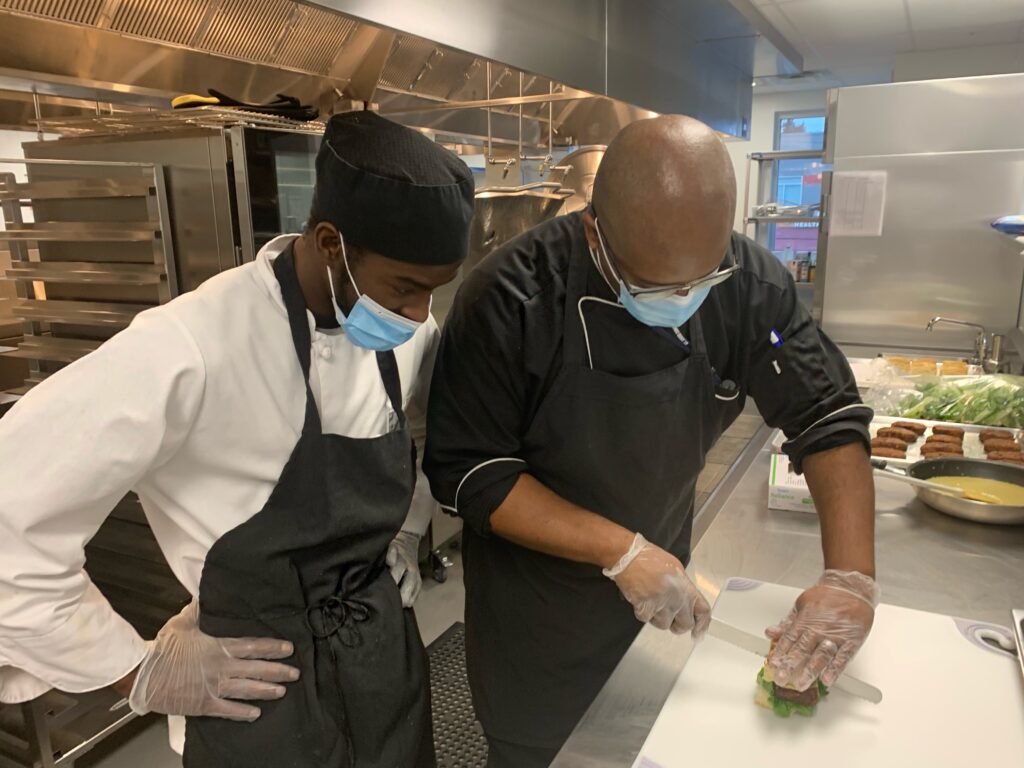Building Opportunity with Propel Kitchens at Washington University in St. Louis
- by bonappetit

A chef instructor demonstrates knife techniques to a participant in Propel Kitchens’ culinary education program. Propel Kitchens offers food industry training and education initiatives to enable St. Louis residents and communities to combat persistent economic and health inequities.
As the dining partner for Washington University in St. Louis (WUSTL) for the past 23 years, the Bon Appétit Management Company team has taken the University’s ethos to serve the greater good to heart, making it an integral part of how we approach operations and interactions with the on- and off-campus communities.
In late 2020, Regional Manager David Murphy began thinking about how to deepen this commitment in partnership with WUSTL Dining. He had recently joined the board of an emerging nonprofit organization called Propel Kitchens, which has a mission to utilize nutrition, food industry training and education initiatives as tools to equip and enable St. Louis residents and communities to combat persistent economic and health inequities.
“There has never been a time when the mission of Propel Kitchens has been more important to the communities that we serve,” says Yvonne Sparks, Propel Kitchens Board Chair. “The pandemic provided a spotlight on the inequities that exist in under-resourced communities, and we serve to eradicate them with food and the preparation of food as a model for change.”
David knew this mission would be meaningful to WashU, and that Propel Kitchens could use a partner with capital to move their plans forward. He pitched an idea to fellow board members: What if WUSTL Dining partnered with Propel Kitchens to launch a new commissary and a fresh, affordable prepared foods program at WashU? WUSTL Dining could start by purchasing a predetermined list of commissary items like marinara sauce (WUSTL Dining’s recipe!) and made-from-scratch dressings and soups from Propel’s training kitchens, then scale up the program.
“I was immediately excited about the potential of a partnership because it had so many benefits for all parties involved,” says David. “When the board started talking about the possibilities, ideas started flying!”
WashU students had expressed a desire for increased plant-based meals across campus. So, in a second phase, Bon Appétit could start sourcing products from Propel’s two social enterprise subsidiaries: Plant-based Artisan Network (PAN) and WiseChoice Meals™️. The WUSTL Dining culinary team would be able to get locally produced plant-based specialty foods like Three Vegan Brothers’ vegan cheese for pizza from PAN as well as a wide selection of fresh, healthy, and affordable grab-and-go options from WiseChoice Meals, streamlining the busy production schedule. Eventually, in a third phase, Propel would begin producing customized grab-and-go meals and become a caterer of choice for affordable drop-off catering on campus, a request from many budget-conscious faculty and administrative teams. Finally, WUSTL Dining and Propel would collaborate to create a Sous Chef Apprentice Program with mentorship from WUSTL Dining culinary staff that would ultimately lead to WUSTL Dining becoming an employer of choice for Propel Kitchens graduates.
The University embraced the idea. Now, Propel Kitchens and the WUSTL Dining culinary and operations teams are working hard to make the vision a reality. In the summer of 2021, Propel Kitchens cut the ribbon to open the 5,000-square-foot culinary space and began building out the kitchen and staff. The Commissary operations support project soft launched in December and the first class of students will officially enroll later this summer.
In 2022, Propel Kitchens expects to graduate their first class of students and be working with the second. Most importantly, while the phased project continues to grow at WashU, Propel Kitchens is continuing to expand its impact on communities throughout St. Louis, as Board President, Yvonne Sparks explains in this in-depth interview with Studio STL on Fox 2 St. Louis.
“The partnership with Bon Appétit has been the catalyst needed for Propel Kitchens to gain its footing in the commercial food space,” says Kisha Lee, Executive Director of Propel Kitchens. “We will continue to build upon this great partnership and expand our reach into new markets that will allow for growth of our workforce development model and the creation of new opportunities to address food insecurities in the communities that need it the most.”